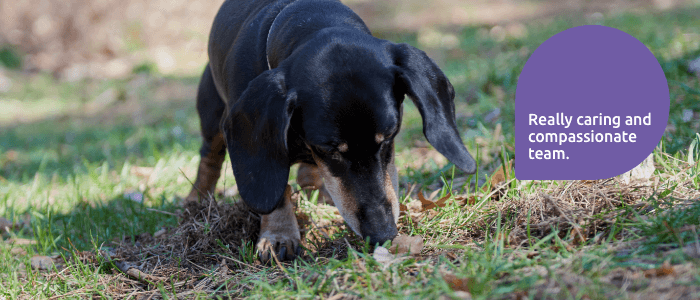Dogs and Cats can suffer from a variety of gastrointestinal problems. Offer this shows as vomiting and diarrhoea.
There are many possible causes, such as simple dietary indiscretion (scavenging), parasites, bacteria, viruses or a disease process within the body.
Signs of particular concern are:
- blood in faeces
- blood in vomit
- dehydration
- vomiting with diarrhoea
- lack of appetite or thirst
- lack of energy
- weight loss

If your dog or cat is WELL in themselves and there is NO BLOOD in the vomit or diarrhoea:
1. Starve/fast them for 12-24hours (No food, only water).
2. Oral rehydration solutions can be offered little and often.
3. Re-introduce small, bland, low fat meals after starving for 24 hours. Ideal foods would be HPM gastro digestive support food, Hills i-d food, boiled rice or pasta with boiled chicken or fish.
4. If the vomiting and diarrhoea has resolved the normal food can be introduced gradually after 3-5 days.
If the symptoms persist, a call to the vet is needed!
If there is BLOOD in the vomit or diarrhoea always seek veterinary advice straight away.
WHAT TREATMENTS MIGHT THE VET GIVE FOR VOMITING OR DIARRHOEA?
1. A special low fat highly digestible food.
2. An injection to stop the nausea, so your pet can keep food and water down, preventing dehydration.
3. A paste such as Protexin Pro-Kolin, to help bind up the diarrhoea and toxins and provide probiotics to help to normalise the digestion.
4. Gastric mucosal protectants and antacids.
5. Occasionally, if there is blood in the stool or the pet is very unwell and has a fever, antibiotics may be prescribed.
6. In young animals particularly, worming or anti-parasite treatment may also be advised.
If VOMITING and/or DIARRHOEA persists, despite supportive treatment…
· A highly digestible, low fat or allergen free prescription diet would usually be recommended.
· A stool sample may be sent to the laboratory for bacteria/virus/parasite tests, to help identify the cause of the diarrhoea and the most appropriate treatment.
· A blood test may be recommended to check the internal organ function, blood cells and electrolyte levels, pancreatic function, folate levels, vitamin B12 levels, and possibly thyroid and adrenal function.
· If your pet is very unwell, they may need to be admitted into a veterinary hospital to have intravenous fluids and supportive care.
· Further investigation with X-rays, endoscopy and ultrasound scan may be necessary.
